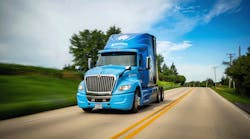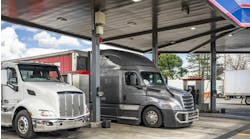Running on renewables: ClearFlame readies engine modification technology for fleet testing
Switching to a new power source can be a major step outside of a fleet’s comfort zone. But what if fleets could convert to renewable energy by retrofitting their existing assets today?
Chicago-based ClearFlame Engine Technologies feels it has found a solution to help “future proof” trucking’s ongoing decarbonization efforts. The startup has developed technology that modifies heavy-duty diesel engines to run on a range of renewable fuels—like ethanol—as a substitute for diesel. According to the company's co-founders, ClearFlame's technology can offer the same power, durability, and performance as today’s diesel engines while readily integrating into existing manufacturing, fueling, maintenance and repair ecosystems.
“We understand our position in the market. We know there is a need out there as a complement to electrification and all the other solutions, like hydrogen, that could use alternative fuels, but in a very scalable way like you get from diesel today,” BJ Johnson, ClearFlame’s CEO and co-founder, told FleetOwner at this year’s Advanced Clean Transportation Expo. “And that’s where we fit in.”
See also: NPTC: Private fleets poised for decarbonization
According to ClearFlame, ethanol is already distributed nationwide in large quantities and could provide significant cost savings for fleets. For instance, ClearFlame calculated that on a diesel gallon-equivalent/energy-equivalent basis, 100% E98 ethanol is more than $2 per gallon less expensive than diesel fuel.
Currently, ClearFlame is working on test cells, running emissions analysis and engine calibration tests, and is continuing road testing with a handful of major U.S. fleets, Johnson noted.
“We’ve got five of the 10 biggest fleets in the country on our fleet council, and we are preparing for a hand-off with them in the next month or two,” Johnson said. “So, we are making sure [the technology] is meeting all the performance requirements they expect, doing work getting refueling infrastructure in place, and basically preparing for the early stages of our market scale.”
'From patent to pilot'
In March, ClearFlame announced the company raised $30 million in Series B funding to bring to market its engine modification solutions that power heavy-duty engines with renewable fuels. The latest investments were led by Mercuria Energy Group, one of the largest privately held energy and commodities companies. New investors include mining corporation Rio Tinto, and Wind Ventures, the strategic venture arm of Copec, one of Latin America's mobility and energy companies.
Before that round of funding, ClearFlame secured $17 million in Series A financing in 2021, led by Breakthrough Energy Ventures, with participation from Mercuria, John Deere, and Clean Energy Ventures. Its initial $3 million Series Seed Financing was also led by Clean Energy Ventures and completed in early 2020.
“Federal Department of Energy funding moved us from concept to patent,” Johnson said in a statement. “Series A funding propelled us from patent to pilot. This latest investment round can accelerate us from pilot to proven product in multiple markets, starting with long-haul trucks.”
In pursuit of penetrating the trucking market, the company is piloting five trucks in collaboration with some of the largest fleet operators in North America. It is also exploring partnerships and applications for the mining, agriculture, and power generation sectors.
See also: Managing expectations for a cleaner freight future
Johnson and ClearFlame CTO and co-founder Julie Blumreiter dedicated their doctoral research at Stanford University to finding solutions to mitigate climate change and achieve carbon reduction goals by freeing heavy-duty diesel engines from their reliance on fossil fuels. The technology ClearFlame developed aims to meet heavy-duty performance requirements while offering "better lifecycle greenhouse gas emissions reduction than EV by nearly 61% using low-soot renewable fuels," according to the company.
Last year, a total cost of ownership study prepared by industry analysts Gladstein, Neandross, and Associates (the group that puts on ACT Expo) found that using ClearFlame engines would reduce lifetime ownership costs for fleet operators.
Market opportunities and partnerships
With its latest round of funding, ClearFlame is in the process of putting fleets into the pilot queue for testing.
“I think that part of the fleets’ excitement is the immediacy in terms of adding a liquid fuel tank, technicians still being able to continue working on the engine, and drivers being able to do pre-trip inspections,” Blumreiter pointed out. “There is such a small delta switch in user behavior. They are getting a greenhouse gas benefit and their drivers and technicians can use the tools they still use.”
In February, fleet diagnostics provider Noregon announced a collaboration with ClearFlame to provide improved coverage for servicing alternative-fuel systems. Noregon will work with ClearFlame to implement coverage for ClearFlame engines into their product suite. The two organizations aim to make operating a greener fleet a more attainable option while ensuring technicians can continue using their existing diagnostic applications to service the vehicles.
From her technical point of view, Blumreiter sees a lot of opportunity within trucking’s existing ecosystems. “There are so many very well-established companies in the industry who have existing expertise,” she said. “This is an opportunity to future proof that by opening up the diesel engine architecture and technology to being more adaptable.”
Johnson also pointed out that larger companies aren’t stepping back on their sustainability initiatives, and that it will take a much more nuanced market to meet varying ESG goals.
“They are demanding progress but no one’s paying for it, and for these solutions that aren’t cost effective today, no one is willing to bear those premiums,” Johnson said. “This is something that ClearFlame has been talking about for a long time now. Sustainability is a real market differentiator if you can provide it in a way that isn’t going to cost people more. The way we actually move the needle on sustainability is making it cost effective.”




